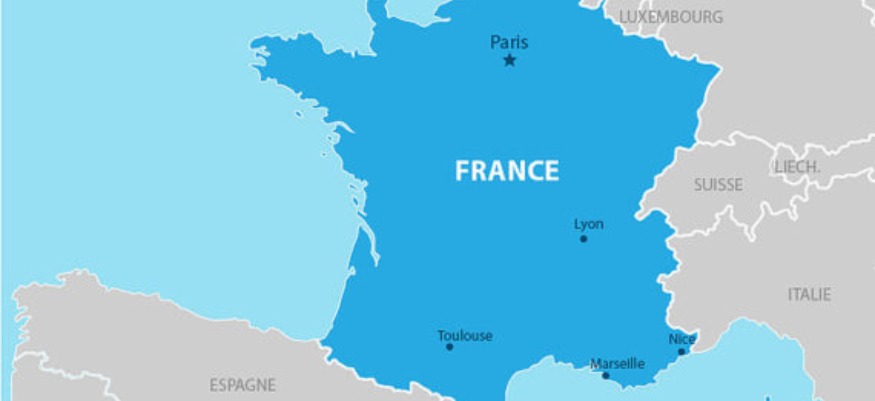
This is what I personally think: France is probably an exception, in the world of the music industry. That’s why it’s a country where it’s difficult, as an artist, to break into, and to make a career.
France, unlike other European countries, and probably on a larger scale, other countries of the world, is a country that suffers from a terrible paradox. We often hear that France is the country with the richest cultural offer in the world. And yet, it’s also the most closed country, in terms of music. Why?
Blame the media?
The media plays a huge role in the closure of France and its musical isolation. It’s not 100% their fault if our country is so closed musically, of course. But I've worked in so many different radio stations and noticed something. Radio stations and TV channels seems to agree to broadcast pre-designed products. Yes, we are talking about products. And not artists. Because the goal of the game, for them, is to release the most profitable product. Some examples ? Jenifer, Kendji, Slimane, Amir, Frero Delavega. You may have never heard of those names of course, cause they never crossed France's borders. But they all have a common point: they are TF1 products, which we see mainly on TF1, which is the first French TV channel. We rarely see them on other TV channels. And we hear them all day long on NRJ, TF1’s historical partner. NRJ is the first radio station in France. The circle is complete. TF1 manufactures the product, NRJ markets it. TF1 is the first historical TV channel in France. When you turn on your TV, it turns on with Channel 1. And NRJ is the first radio station in France and covers all the territory... You got it?
Blame the listeners?
The musical isolation of France is certainly accentuated by the media. And of course, we can't really blame the listeners for that weird situation cause it's not their fault.
Sometimes I just have the feeling that France operates on a simple strategy but often passed over silence: "I don’t know it, so I don’t like it". Oh. This is what I call sadness with a big S. Yes, some French people are undeniably very closed to discovery. You may think, on the other hand, that Spotify could help us to get more curious about what they don't know. But here in France, Spotify is almost unknown and most people don't know what it is. We have a kind of French Spotify that is called "Deezer" though, and a lot of people are using it. So everything's not lost :) But as people were used to hearing the same songs on the radio, again and again, they will just add those songs to their playlists and won't really use the discoveries features of those apps. Even those words: INDIE MUSIC. They're unknown to most French people. When I tell my friends that I'm promoting indie music, they just look at me in a strange way. And their first question is "what is indie?".
The fear of discovery
Come on, enough blah blah. Now, we will talk concretely with an example.
Once you had a listen to that track, make someone from your entourage have a listen to « Different » from The Academic band.
A Dutchman, a German, or an Englishman will tell you « Amazing », « I love it! » While some Frenchmen will tell you « It’s not famous? So, I don’t like it! « . That's quite a very sadly reductive point of view. But so sadly real. And you don’t need to go far to try the experience: try with a French guy you may know. Fortunately, it's still possible to find some French people who will love this song.
So, French people are going to tell us » yeah, well, they’re Irish, so we just don’t know about them. » OKAY. In this case, we will follow this way of thinking, with another example.
Bon Air is a French duo. They come from Guéthary, in the Basque Country, a beautiful village perched on the Atlantic coast. Do you like it? It’s not aired here in France on the radio. And honestly, the track has every chance to be exported abroad: the writing in English is great, the almost imperceptible French accent, and the melody is rich. The band often travels abroad, especially in New Zealand where they find inspiration to write and compose sumptuous melodies. Because music is a way of life, a culture. And they had the good idea to look elsewhere for the culture and openness that France lacks.
Did you say « fear »? Yeah, I said « fear »!
Some French listeners won’t make any effort to dig novelty. Novelty scares them. It’s an unconscious feeling. On the other hand, what they know reassures them. And what they know very well, even more. Why do we still hear from Jean-Jacques Goldman every day on RFM? Because this is the most famous French singer, and everybody knows about him here. He also wrote hundreds of songs for other French artists. And French listeners love to be served again and again of what they already know. Because it reassures them. And in terms of radio, a song from Jean-Jacques Goldman, is called a « strong » track. Because he reassures. But we can bet that this artist is totally unknown elsewhere... On the other hand, our little Irish band from The Academic, or our French favorites of Bon Air, won’t be aired. Because for French radio stations, it’s what they call « risk-taking ». Yes, you read that right. We talk about risk when we broadcast an unknown song. It must always be « secured » between two very well-known tracks. While abroad, spreading discoveries seems to be a daily practice, and seems perfectly rooted in morals. Maybe it's because French radio stations added something important in the game: very high rotations, like playing the same songs every 90 minutes. Here, if you listen to a radio station from 6AM to 9PM, you'll hear the same songs... 15 times. Human brain is made like that: loving something it's used to. So just try the experiment by yourself. Chose a song you already heard and thought "I don't like it". Start to play it 15 times a day for 3 or 4 days. At the end of the experiment, you will love this song. And even sing along. Just because your brain is now used to hear it. This is one of our psychological weaknesses. And the media perfectly know how to take advantage of this weak point.
French exception?
Almost. As we said before, our Belgian, Swiss, and Luxembourgish neighbors are drinking from the French media, and the same thing is going on there. But just pass the Channel and go for a ride in the UK. Turn on any radio station, even the most popular. Of course, you’ll hear today's biggest hits. But not only. You would be surprised to hear the Spice Girls, always scheduled daily, alongside artists completely unknown from the public. Because Great Britain seems to be musically more opened to discover something new. At least, that's what I felt when I went there.
Do France export its music?
Oh yes, fortunately, we manage to export French artists. And contrary to popular belief, foreign media don’t go to excess with Edith Piaf or Gainsbourg. As proof, some British radios like the BBC already pushed on air Christine and The Queens, Daft Punk, or Phoenix, for example. However, they have never heard of Johnny Hallyday or Patrick Bruel. We experienced it in the UK. After a quizzical look, they gave us a spontaneous "Who’s that?"... Rather disconcerting for any French people. It was a strange experience: at once scary because it feels like you’re talking to people who are a bit ignorant, but also reassuring, because you realize that you’ve set foot in a country more open to discovery because they have many more artists to discover, than us. So, we can tell that « popularity » has a different meaning, from a country to another. But hey, after all, maybe English people never heard of Johnny Hallyday, but I have to admit that I'm not able to name the most famous German singers. So this may not be only our fault haha.
Will it ever change?
Bad news: probably not. And the reason is simple: you can’t change the whole culture of a country. Because it’s really a matter of culture. Musically, France looks a bit closed. United States, UK, Germany, Netherlands, Asian countries, are open to what they don’t know and are very curious and eager to discover. Unless a radio revolution happens. If tomorrow, NRJ starts broadcasting Kodaline, Sunrise Avenue, or Flo Chase, these artists will become huge stars in France. For now, they remain perfect strangers for almost everyone here. Because the French media works on a strategy: they don’t play hits, they create them! It is by putting a song every 2 hours on air, that the song becomes a hit.
Even if we create a web radio?
Unfortunately: no way. When you read all that, it’s tempting to create a web radio that has the right balance of hits and discoveries. We have already tried, our web radio closed in 2018 after 13 years of existence (which is already a record). But it never took off. Because you have to live with your time. We are in 2020 and the Internet radio is out of date. However, creating playlists on Spotify, or a YouTube channel, is easier to do and really cheaper. But we didn't discourage ourselves and launched our IMC Radio station though. Cause it's still a powerful tool to promote indie music and we didn't want our artists to miss it.
Can we make any song a hit?
Well… yes! That’s why, if you're an artist, please don't discourage yourself. Everything is possible!
A recent example is shouting truth: Come and Get Your Love, from Redbone.
France has heard this track a lot last year on the radio. A real huge hit. Yet, it’s a 1974 track! Who would’ve believed that?! A French phone mobile network, Bouygues Télécom, used this song in a Christmas commercial, broadcasted from October to December 2018 on French screens, so the track got more and more Shazams. And more and more streams on Spotify. So the radios stations wanted to follow the trend and start to play it every day, with high rotation. Then they marketed the track on CD compilations. And the song finally became known in France, 45 years after its release.
Shared wrongs?
From this concrete example, the Redbone’s track, we can see the power of the media here. Because television has given this old track its nobility. And radios just have surfed the wave. And this explosion of streaming plays (nearly 10 million, like that, suddenly!) is due … to France. The song didn't get a huge peak of streams out of France. And foreign radio has always played since its release, no one has forgotten it. In France, we didn’t even know about this track. Because TV discovered it, then radio discovered it, and so, French listeners discovered it. The wrongs are therefore shared. The media contribute to this cultural closure, and the French people seem to agree.
Can a French artist break into the international scene?
Fortunately, yes! Of course, speaking correct English will be your best weapon. If so, then yes, an international career is possible. If your writing in English is fluent, and your composition is neat, you can succeed. When it comes to exporting, there are a lot of things to do. How to write correctly in English? How to develop a good digital strategy? Where to send your music? On all those points, we can help you!
Some other artists don’t need our help anymore, and that’s good! We can use this fine example of French success abroad, with the Lyon-based band Nazca.
But I am open!
Great! That’s the best news we’ve heard for a long time. You will enjoy your life, having a much richer musical culture. We invite you to take a look at our music blog, Indie Music Center , which is full of nuggets that will stay in your mind all day long. Music is a universal language.

























